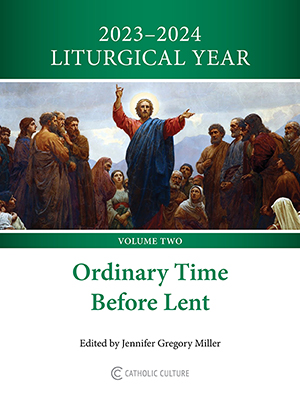Fathers of the Church
Epistle VIII: to Boniface, Deacon
by Gregory the Great in 603 | translated by James Barmby, D.d
Gregory to Boniface, Deacon at Constantinople.
As often as the discord of those who ought to have been preachers of peace makes us sad, we should study with great solicitude that cause of contention may be removed, and that those who differ among themselves may return to concord. Now what has been done with respect to the camp of Cassiopus, which is situate in the island of Corcyra, and how the bishop of Euria is endeavouring to withdraw it from the jurisdiction of the bishop of Corcyra, and iniquitously to subject it to his own jurisdiction, it would be very tedious to tell. But, that your Love may understand all things fully, we have sent to you the letters of our brother Alcyson, the bishop of Corcyra, and have caused his man to go to you to inform you of everything more particularly by word of mouth. This, however, we briefly mention, that an order having been surreptitiously obtained from the late Emperor Mauricius, which order, having been given in opposition to the laws and sacred canons, had no effect, and the dispute between the parties remaining undecided, he gave another order to our late brother Andrew, then Metropolitan of Nicopolis, to the effect that, as both parties were subject to his jurisdiction, he should take cognizance of the case and terminate it canonically. The said Metropolitan, having taken cognizance of the case and pronounced sentence, of which we send you a copy, decided the aforesaid camp of Cassiopus to be under the power and jurisdiction of the bishop of Corcyra, in whose diocese it always was; and we, approving his sentence, have thought fit to confirm it by the authority of the Apostolic See. And, lest what we decreed should be so strict as to seem to have no admixture of benignity, we took care so to order the matter for the time being (as the text of our sentence which we send to thee shews) that neither should the bishop or clergy of the city of Euria incur the necessity of residence, nor the privileges of the Church of Corcyra be in any way disturbed. But inasmuch as at the very beginning of proceedings an order was surreptitiously got from the most serene lord the Emperor, and (contrary to the judgment of the Metropolitan of Nicopolis, which rested on ecclesiastical propriety and canonical reason) the aforesaid camp of Cassiopus is said to have been handed over to the bishop of Euria (a thing we cannot hear without grief or tell without groans), with still greater wrong to the bishop of Corcyra and his clergy, in such sort as (sad to say) to take away entirely the jurisdiction of the Church of Corcyra, and give as it were to the bishop of Euria the whole principal jurisdiction there; this being so, we have thought right to deliver our sentence to no one, lest we should seem to do anything contrary to the order of our most clement lord the Emperor, or (which God forbid) in contempt of him. Wherefore let thy Love diligently represent the whole matter to his Piety, and steadily insist that the thing is altogether unlawful, altogether bad, altogether unjust, and greatly opposed to the sacred canons. And so may he not allow a sin of this sort to be introduced in his times to the prejudice of the Church. But represent to him what is contained in the judgment of the aforesaid late metropolitan on the business, and in what manner his decision had been confirmed by us, and endeavour so to act that our sentence, with an order from him, may be sent to those parts, to the end that we may be seen to have paid due deference to his Serenity, and to have corrected reasonably what had been presumptuously done amiss. In this affair pains must by all means be taken that, if it can be effected, he may contribute also his own order, enjoining the observance of what has been decided by us. For if this is done, all place for subornation hereafter will be shut out. Make haste, then, so to exercise thy vigilance, with the help of Almighty God, for abating these wrongs, that neither may the will of those who attempt perverse things obtain any advantage now against the ancient settlement of ecclesiastical usage, nor a nefarious proceeding gain ground for example afterwards.
Furthermore, that thou mayest know what wrongs and what oppressions the above-written Alcyson, our brother and fellow-bishop, asserts that he endures from the agents (actionariis) of the Church of Thessalonica, we have forwarded to thy Love the letter which he has sent to us. And do thou accordingly cause the responsalis of the aforesaid Church to come to thee, anti take cognizance of the case in his presence, and write to our brother and fellow-bishop Eusebius, on such heads as reason may suggest to thee, that he may prohibit his men from acting unjustly, and warn them not to oppress interiors, but rather help them in whatever may be just. This also we desire; that thy Love should write to him who may have been ordained as Metropolitan in the city of Nicopolis, to the end that he may take cognizance of the case with regard to the injuries which our aforesaid brother Alcyson complains of having been inflicted on his Church, and decide what is just, seeing that the matter itself is stated not to have been decided by his predecessors, but reserved.
Taken from "The Early Church Fathers and Other Works" originally published by Wm. B. Eerdmans Pub. Co. in English in Edinburgh, Scotland, beginning in 1867. (LNPF II/XIII, Schaff and Wace). The digital version is by The Electronic Bible Society, P.O. Box 701356, Dallas, TX 75370, 214-407-WORD.







